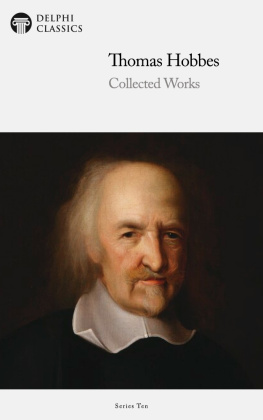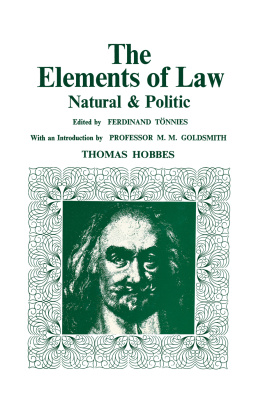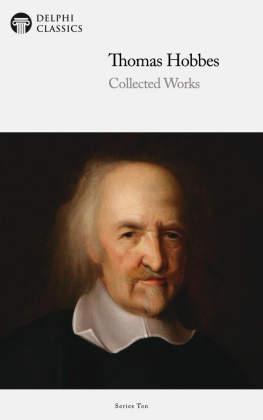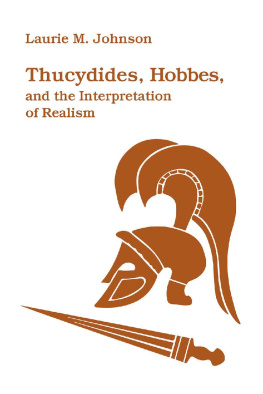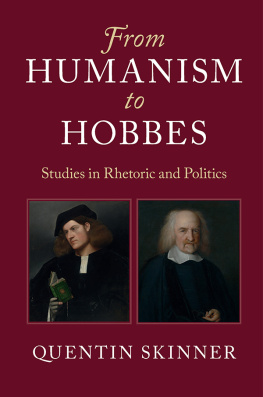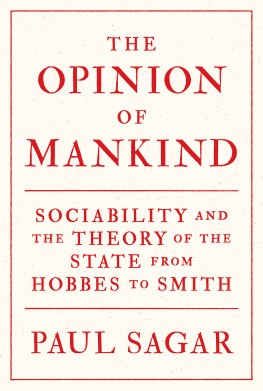Thomas Hobbes - The English Works, vol. VI (Dialogue, Behemoth, Rhetoric)
Here you can read online Thomas Hobbes - The English Works, vol. VI (Dialogue, Behemoth, Rhetoric) full text of the book (entire story) in english for free. Download pdf and epub, get meaning, cover and reviews about this ebook. year: 2016, publisher: oll.libertyfund.org, genre: Science. Description of the work, (preface) as well as reviews are available. Best literature library LitArk.com created for fans of good reading and offers a wide selection of genres:
Romance novel
Science fiction
Adventure
Detective
Science
History
Home and family
Prose
Art
Politics
Computer
Non-fiction
Religion
Business
Children
Humor
Choose a favorite category and find really read worthwhile books. Enjoy immersion in the world of imagination, feel the emotions of the characters or learn something new for yourself, make an fascinating discovery.

- Book:The English Works, vol. VI (Dialogue, Behemoth, Rhetoric)
- Author:
- Publisher:oll.libertyfund.org
- Genre:
- Year:2016
- Rating:3 / 5
- Favourites:Add to favourites
- Your mark:
- 60
- 1
- 2
- 3
- 4
- 5
The English Works, vol. VI (Dialogue, Behemoth, Rhetoric): summary, description and annotation
We offer to read an annotation, description, summary or preface (depends on what the author of the book "The English Works, vol. VI (Dialogue, Behemoth, Rhetoric)" wrote himself). If you haven't found the necessary information about the book — write in the comments, we will try to find it.
The English Works, vol. VI (Dialogue, Behemoth, Rhetoric) — read online for free the complete book (whole text) full work
Below is the text of the book, divided by pages. System saving the place of the last page read, allows you to conveniently read the book "The English Works, vol. VI (Dialogue, Behemoth, Rhetoric)" online for free, without having to search again every time where you left off. Put a bookmark, and you can go to the page where you finished reading at any time.
Font size:
Interval:
Bookmark:
london: c. richards, printer, st. martins lane.
Edition: current; Page: [ none ]- A Dialogue between a Philosopher and a Student of the Common Laws of England - - - -
- Behemoth: the History of the Causes of the Civil Wars of England - - - - - -
- The Whole Art of Rhetoric - - - -
- The Art of Rhetoric, plainly set forth with pertinent examples for the more easy understanding of the same -
- The Art of Sophistry - - - - -
What makes you say, that the study of the law is less rational than the study of the mathematics?
Of the law of reason.I say not that; for all study is rational, or nothing worth: but I say, that the great masters of the mathematics do not so often err as the great professors of the law.
If you had applied your reason to the law, perhaps you would have been of another mind.
In whatsoever study, I examine whether my inference be rational: and have looked over the titles of the statutes from Magna Charta downward to this present time. I left not one unread, which I thought might concern myself; which was enough for me, that meant not to plead for any but myself. But I did not much examine which of them was more or less rational; because I read them not to dispute, but to obey them, and saw in all of them sufficient reason for my obedience, and that the same reason, though the Statutes themselves were changed, remained constant. I have also diligently read over Littletons book of Tenures, with the commentaries thereupon of the renowned lawyer Sir Edward Coke; in which I confess I found great subtilty, not of the law, but Edition: current; Page: [ 4 ] of inference from law, and especially from the law of human nature, which is the law of reason: and I confess that it is truth which he says in the epilogue to his book, that by arguments and reason in the law, a man shall sooner come to the certainty and knowledge of the law: and I agree with Sir Edward Coke, who upon that text farther says, that reason is the soul of the law; and upon section 138, nihil, quod est contra rationem, est licitum; that is to say, nothing is law that is against reason; and that reason is the life of the law, nay the common law itself is nothing else but reason; and upon section 21, quitas est perfecta qudam ratio, qu jus scriptum interpretatur et emendat, nulla scriptura comprehensa, sed solum in vera ratione consistens; i. e. Equity is a certain perfect reason, that interpreteth and amendeth the law written, itself being unwritten, and consisting in nothing else but right reason. When I consider this, and find it to be true, and so evident as not to be denied by any man of right sense, I find my own reason at a stand; for it frustrates all the laws in the world. For upon this ground any man, of any law whatsoever, may say it is against reason, and thereupon make a pretence for his disobedience. I pray you clear this passage, that we may proceed.
I clear it thus, out of Sir Edward Coke ( i. Inst. sect. 138), that this is to be understood of an artificial perfection of reason, gotten by long study, observation, and experience, and not of every mans natural reason; for nemo nascitur artifex. This legal reason is summa ratio; and therefore if all the reason that is dispersed into so Edition: current; Page: [ 5 ] many several heads, were united into one, yet could he not make such a law as the law of England is; because by so many successions of ages it hath been fined and refined by an infinite number of grave and learned men.
This does not clear the place, as being partly obscure, and partly untrue. That the reason which is the life of the law, should be not natural, but artificial, I cannot conceive. I understand well enough, that the knowledge of the law is gotten by much study, as all other sciences are, which when they are studied and obtained, it is still done by natural, and not by artificial reason. I grant you, that the knowledge of the law is an art; but not that any art of one man, or of many, how wise soever they be, or the work of one or more artificers, how perfect soever it be, is law. It is not wisdom, but authority that makes a law. Obscure also are the words legal reason. There is no reason in earthly creatures, but human reason. But I suppose that he means, that the reason of a judge, or of all the judges together without the King, is that summa ratio, and the very law: which I deny, because none can make a law but he that hath the legislative power. That the law hath been fined by grave and learned men, meaning the professors of the law, is manifestly untrue; for all the laws of England have been made by the kings of England, consulting with the nobility and commons in parliament, of which not one of twenty was a learned lawyer.
You speak of the statute law, and I speak of the common law.
I speak generally of law.
Edition: current; Page: [ 6 ]Thus far I agree with you, that statute law taken away, there would not be left, either here, or any where, any law at all that would conduce to the peace of a nation; yet equity and reason, (laws Divine and eternal, which oblige all men at all times, and in all places), would still remain, but be obeyed by few: and though the breach of them be not punished in this world, yet they will be punished sufficiently in the world to come. Sir Edward Coke, for drawing to the men of his own profession as much authority as lawfully he might, is not to be reprehended; but to the gravity and learning of the judges they ought to have added in the making of laws, the authority of the King, which hath the sovereignty: for of these laws of reason, every subject that is in his wits, is bound to take notice at his peril, because reason is part of his nature, which he continually carries about with him, and may read it, if he will.
It is very true; and upon this ground, if I pretend within a month or two to make myself able to perform the office of a judge, you are not to think it arrogance; for you are to allow to me, as well as to other men, my pretence to reason, which is the common law, (remember this, that I may not need again to put you in mind, that reason is the common law): and for statute law, seeing it is printed, and that there be indexes to point me to every matter contained in them, I think a man may profit in them very much in two months.
But you will be but an ill pleader.
A pleader commonly thinks he ought to say all he can for the benefit of his client, and therefore has need of a faculty to wrest the sense of Edition: current; Page: [ 7 ] words from their true meaning, and the faculty of rhetoric to seduce the jury, and sometimes the judge also, and many other arts which I neither have, nor intend to study.
But let the judge, how good soever he thinks his reasoning, take heed that he depart not too much from the letter of the statute: for it is not without danger.
He may without danger recede from the letter, if he do not from the meaning and sense of the law; which may be by a learned man, (such as judges commonly are,) easily found out by the preamble, the time when it was made, and the incommodities for which it was made. But I pray tell me, to what end were statute laws ordained, seeing the law of reason ought to be applied to every controversy that can arise.
Font size:
Interval:
Bookmark:
Similar books «The English Works, vol. VI (Dialogue, Behemoth, Rhetoric)»
Look at similar books to The English Works, vol. VI (Dialogue, Behemoth, Rhetoric). We have selected literature similar in name and meaning in the hope of providing readers with more options to find new, interesting, not yet read works.
Discussion, reviews of the book The English Works, vol. VI (Dialogue, Behemoth, Rhetoric) and just readers' own opinions. Leave your comments, write what you think about the work, its meaning or the main characters. Specify what exactly you liked and what you didn't like, and why you think so.

